
Geo-economics of the Russian invasion of Ukraine
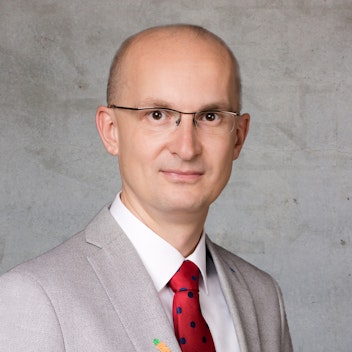 Bartosz Stefan Michalski
Bartosz Stefan Michalski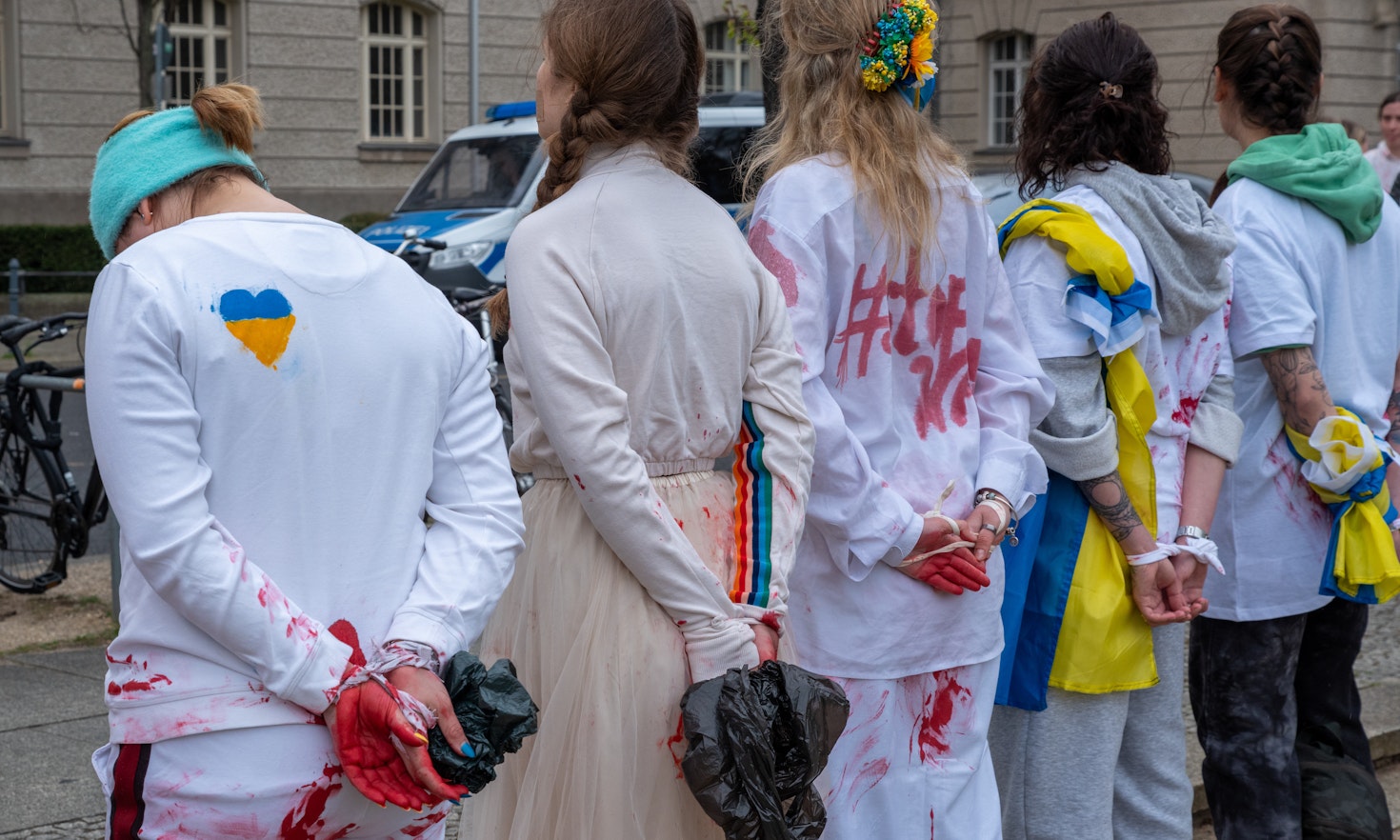
The International Day for the Elimination of Sexual Violence in Conflict provides us with an important opportunity to reflect on this specific form of violence and its distressing prevalence in ongoing conflicts, including the war in Ukraine. Despite persistent efforts towards its elimination undertaken by the United Nations and numerous civil society organizations during the past decades, there remains an urgent need to raise awareness and advocate for survivor-centered preventive measures and responses.
In 2015, the UN General Assembly designated June 19 as the International Day for the Elimination of Sexual Violence in Conflict. The day of observance was created not only to raise awareness on the need to put an end to conflict-related sexual violence but also to honour survivors of sexual violence as well as activists who have mobilised against this phenomenon.
The scourge of sexual violence in conflict refers to any form of sexual and reproductive violence (e.g. rape, sexual slavery, forced prostitution, forced pregnancy, forced abortion, enforced sterilization) perpetrated against women, men, girls and boys and directly or indirectly linked to a conflict situation. The notion of conflict embraces interstate wars, civil wars and intrastate conflicts, such as riots and other forms of violence. As UN Secretary-General António Guterres intoned in his official message for the International Day of June 19, sexual violence in conflict is widespread and enduring: “This despicable crime persists despite international commitments to stamp it out. And many of those responsible never face justice. While stigma too often causes survivors to walk in shame, perpetrators walk free”.
Twenty-five years after its launch by the UN, the fight against sexual violence in conflict continues with a focus on technology and the digital divide. Online gender-based violence has been increasing everywhere during the last decade, and it has been used to fuel ongoing conflicts by spreading gender-based hate speech, derogatory pornographic content and incitement to sexual violence. As always, rape and other forms of sexual violence are used to humiliate, destabilize and tear apart ‘enemy’ communities; moreover, they have long-lasting effects even in peacetime, as the case of the difficult path towards legal recognition for Bosnian children born as a result of wartime rapes committed in the 1990s dramatically shows. In general, the occurrence of these forms of violence makes the scars of conflicts very difficult to treat.
Rape and other forms of sexual violence are used to humiliate, destabilize and tear apart ‘enemy’ communities – with long-lasting effects.
Alexandra Cosima Budabin and Elisa Piras
On June 19, the United Nations commemorates the adoption in 2008 of Security Council resolution 1820, which for the first time recognized sexual violence as a tactic of war and condemned the crime as an impediment to peacebuilding. This document followed the landmark Resolution 1325 on Women, Peace and Security, adopted unanimously by the UN Security Council on 31 October 2000, which spotlighted the adverse effects of conflicts on women and girls. In addition, the Resolution recognised the essential role of women in the prevention and resolution of conflicts, peace negotiations, peacebuilding, peacekeeping, humanitarian response and post-conflict reconstruction, opening the path to the so-called Women, Peace and Security Agenda, an ambitious programme aimed at reforming the norms and practices shaping the sector of security.
The passing of Resolution 1325 had gained particular urgency in the wake of the horrors of mass sexual violence in conflict seen during the wars of the 1990s, especially in the Balkans and Rwanda. This landmark resolution explicitly referenced the weaponization of rape and asked for “special measures to protect women and girls from gender-based violence”. The onus was put on States “to put an end to impunity and to prosecute those responsible for genocide, crimes against humanity, and war crimes, including those relating to sexual and other violence against women and girls”. Alongside States, women’s organizations have played a crucial role in localizing the implementation of the Women, Peace and Security Agenda. But the issue of sexual violence in conflict has often received only intermittent attention.
During the 1990s, mobilization against gender-based and sexual violence in conflicts had been confined for the most part to NGOs operating in and around the United Nations, inspired and supported by academics and activists of women’s rights such as Catherine MacKinnon and Sanam Naraghi-Anderlini. After 2000, the movement to raise awareness on sexual violence in conflict became more globalized, with campaigns being organised within and across countries.
In 2007, the network UN Action Against Sexual Violence in Conflict was created to link 21 entities to promote a survivor-centred approach. Two years later, the network launched its own awareness campaign called "Stop Rape Now". The Campaign includes a website, and social media platforms around the hashtag #stoprapenow, and offers various resources. There is also engagement from UN Celebrity Ambassadors such as Nicole Kidman, Charlize Theron, and Angelina Jolie.
Among the different actions undertaken over the years, it is worth mentioning the print and poster campaign organised by Amnesty International in 2009, whose international reach has grown considerably through social media. Although the slogan “Rape is cheaper than bullets” and the images associated were shocking and caused outrage at the time, the appeal certainly helped open up the debate on an issue that had been taboo for public discourse until then.
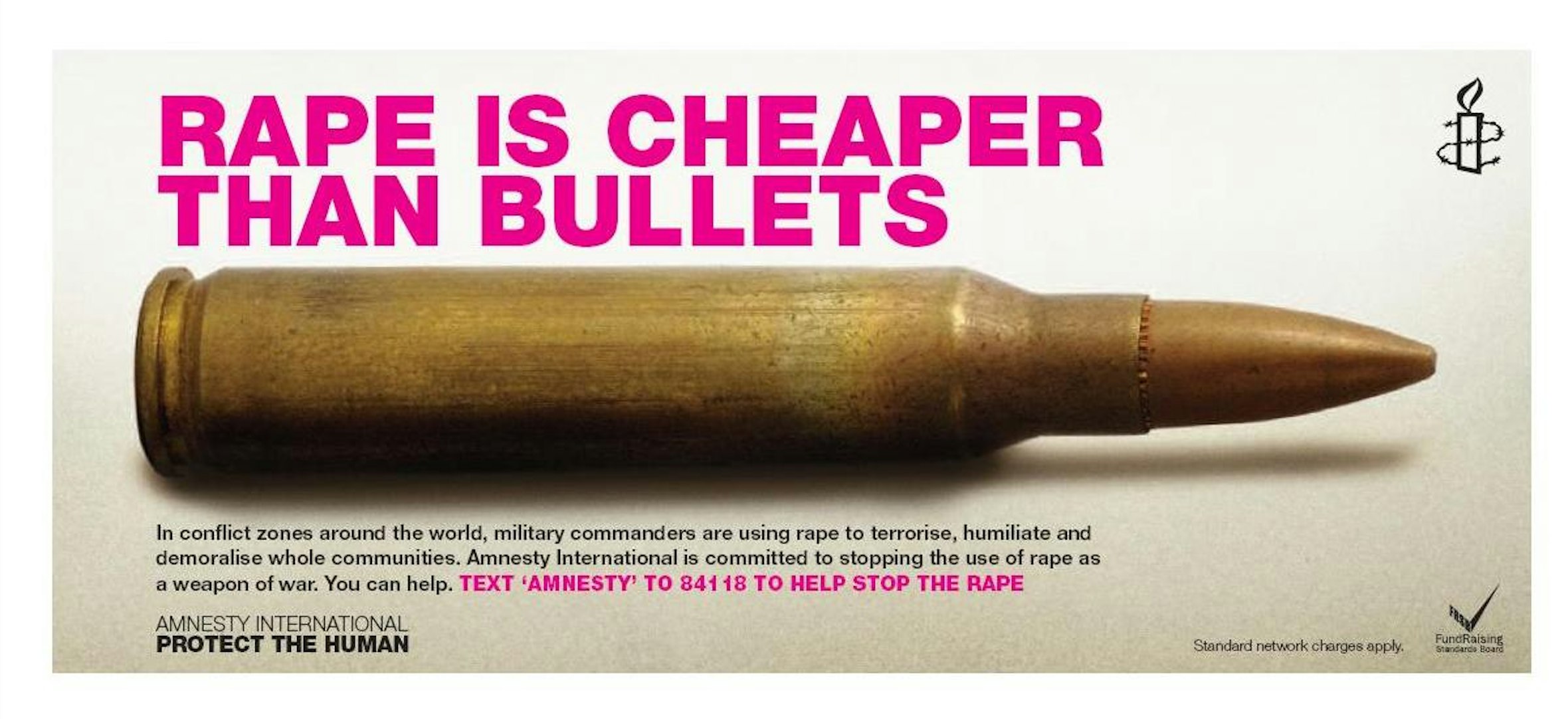 Photo: Amnesty International | All rights reserved
Photo: Amnesty International | All rights reservedFirst, it is crucial to hold States and other actors accountable for implementing effective policies to protect women, girls, men, and women from sexual violence in conflict, a war crime prohibited under international humanitarian law. Also, these crimes are predictable and preventable; therefore, States must put in place appropriate monitoring and prevention measures.
Second, an international campaign to raise awareness about sexual violence as a war crime is also necessary to send a message of support and solidarity to survivors. As experts from the International Committee of the Red Cross argue, “sexual violence still remains largely a silent and hidden crime”. Public campaigns can help remove the stigma that often prevents survivors of sexual violence from coming forward. It is estimated that for every rape reported to the authorities, 10 to 20 cases may go unreported, leading to impunity for the perpetrators of these crimes.
Thirdly, when any conflict erupts, it is necessary to act quickly across diplomatic, peacekeeping, and humanitarian forces to address early warning signs, “name and shame” parties suspected of committing or being responsible for sexual violence, and report and research the incidence of the phenomenon. Public campaigns help to keep the attention high within security organizations on sexual and gender-related violence, contributing to organizational change, especially insofar as recruitment and training policies are concerned.
Indeed, this rapid response was seen in the case of Ukraine. Although at the moment there are no comprehensive data available, there have been repeated incidents of conflict-related sexual violence and increasing levels of domestic violence have been the norm since the start of the Russian offensive in February 2022. A report issued by the UN Office of the High Commissioner for Human Rights in early 2023 stated that, for the period February 2022 – 31 January 2023, there were 133 documented cases of conflict-related sexual violence (85 men, 45 women, three girls), the majority of which took place in territory occupied by the Russian Federation. As data show, this is not only a women’s problem.
Recently, UN Special Representative on Sexual Violence in Conflict Pramila Patten recognised that NGOs, media and the international community have been paying particular attention to this form of violence in the context of the ongoing war in Ukraine: “never before has sexual violence – war’s oldest, most silenced, and least-condemned crime – been taken so seriously from the outset of a crisis, rather than being relegated to an afterthought. This has given rise to unprecedented international attention and action”.
At this stage of the ongoing conflict, collecting evidence about committed crimes and protecting and supporting survivors is extremely important. Therefore, in March 2023, the EU launched an initiative – the International Centre for the Prosecution of Crimes of Aggression against Ukraine – aimed at documenting and investigating core international crimes such as cases of torture, ill-treatment, sexual violence and summary executions. This activity is fundamental to guaranteeing post-conflict justice. However, it is unclear at the moment whether the Court or Tribunal could make use of the collected evidence since Russia does not recognize the authority of the International Criminal Court. One of the options on the table is the creation of an ad hoc UN Criminal Tribunal, similar to those established in the aftermath of the conflicts in Former Yugoslavia and Rwanda.
In the policy brief “A feminist response to Russia’s war in Ukraine”, the Kvinna till Kvinna Foundation – a Swedish NGO founded in 1993 to support women’s rights in conflict situations – highlights the fact that women’s human rights in Ukraine were being violated even before the start of the war: since 2014, when the crisis in Donbas escalated, in the occupied areas of the country and neighbouring regions cases of sexual violence have been reported by Kvinna till Kvinna and its local partners. Throughout the conflict, Ukrainian civil society organisations defending the rights of women, LGBTQ people, and people with disabilities (e.g. the Centre Women’s Perspectives, Fight for Right, Insha, Slavic Heart, Sphere) have been alert. They have worked to protect survivors, guaranteeing physical and mental health assistance as well as legal advice to local people and supporting the UN and other international organisations providing humanitarian aid.
Fostering the participation of women and human rights defenders in the post-conflict phase is crucial to establish a peace where the fight against gender-based and sexual violence is a daily commitment shared by institutions and civil society.
Alexandra Cosima Budabin and Elisa Piras
As the Ukrainian case shows, building partnerships between international organizations, local institutions, and local civil society actors such as feminist networks and human rights defenders is crucial in order to monitor and contrast gender-related and sexual violence in conflict situations. The international community’s role should be to support and give visibility to the actions implemented by local stakeholders, relying on their expertise to imagine solutions for conflict resolution and post-conflict peacebuilding that make it possible to initiate a fair reconciliation process. As far as conflict-related sexual violence is concerned, this means adopting a survivor-centered approach, avoiding impunity and focusing on the (physical and psychological) healing of traumatized survivors of violence and guaranteeing their full reintegration into society. This also means fostering the participation of women and human rights defenders in the post-conflict phase, making their contribution meaningful to establish a peace where the fight against gender-based and sexual violence is a daily commitment shared by activists, institutions and civil society.
As far as international public opinion is concerned, attention raising is still needed to fight the cultural roots of conflict-related sexual violence, in the framework of a progressive affirmation of a culture of respect and gender equality. UN Action recently announced a strategy to raise $100 million to reinvigorate its #StopRapeNow campaign. Keeping the attention high on this issue means looking beyond Ukraine’s borders, working to prevent, monitor and prosecute sexual violence in all ongoing wars and conflicts, especially in those that receive little or intermittent attention from media and governments. Victims and survivors in contexts as diverse as Yemen, Myanmar, Iran, just to mention a few, all have a right to be acknowledged and obtain justice.

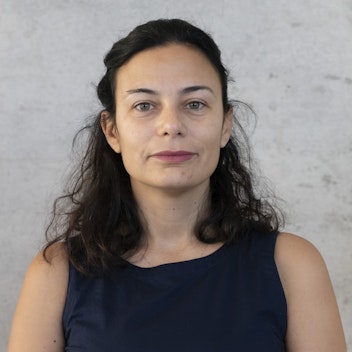
This content is licensed under a Creative Commons Attribution 4.0 International license.

 Bartosz Stefan Michalski
Bartosz Stefan Michalski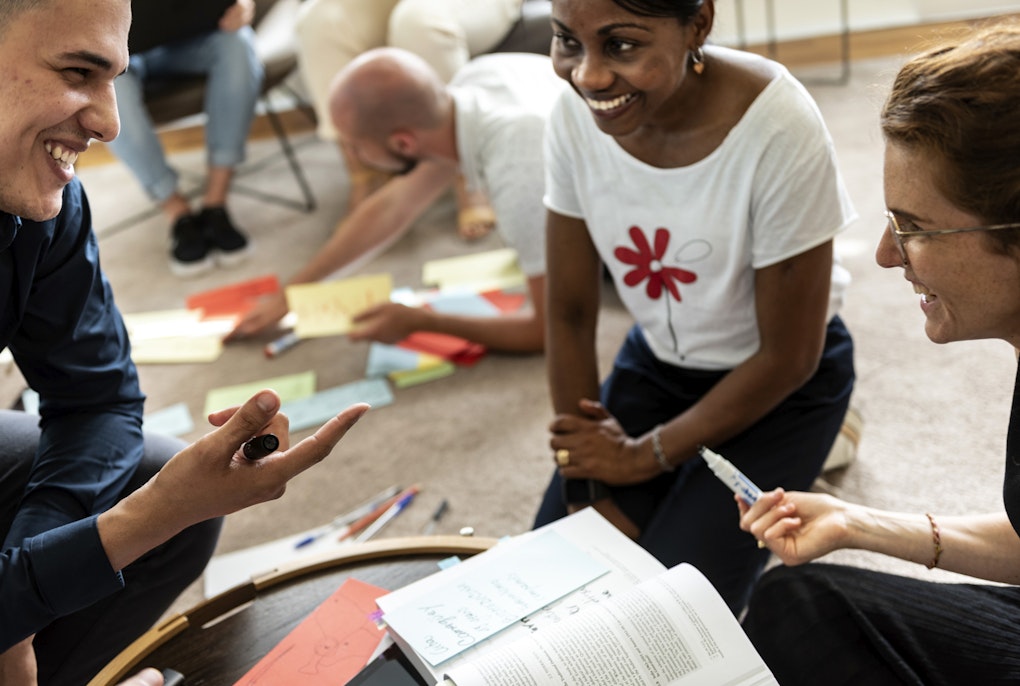
 Roland Benedikter
Roland Benedikter Maarten Jan Wensink
Maarten Jan Wensink